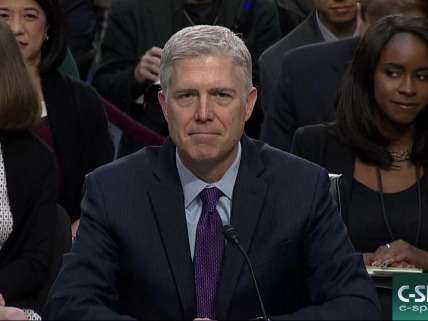Gorsuch Calls Trump's Attacks on Judges 'Disheartening' and 'Demoralizing'
The president dismisses his SCOTUS nominee's objections.

During his confirmation hearing yesterday, Neil Gorsuch publicly repeated his private criticism of the man who nominated him to the Supreme Court, calling President Trump's attacks on the authority of federal judges "disheartening" and "demoralizing." Gorsuch, who currently serves on the U.S. Court of Appeals for the 10th Circuit, said judges "have to accept criticism" but objected to attacks on their "integrity or honesty or independence."
Gorsuch was responding to questions from Sen. Richard Blumenthal (D-Conn.), who cited three occasions when Trump questioned the integrity of federal judges who ruled against him:
- During the presidential campaign, Trump complained that Gonzalo Curiel, the federal judge hearing a lawsuit against Trump University, was hostile to him. Trump suggested that the Indiana-born judge, whom he described as "Mexican," was biased against him because of his promise to block illegal immigration. "I'm building a wall," the candidate told The Wall Street Journal. "It's an inherent conflict of interest."
- After James Robart, a federal judge in Seattle, issued a temporary restraining order against Trump's travel ban last month, the president tweeted that "the opinion of this so-called judge, which essentially takes law-enforcement away from our country, is ridiculous and will be overturned!" A subsequent tweet said Americans should "blame him and [the] court system" if a terrorist attack occurred while the case was pending.
- A few days later, Trump preemptively criticized the 9th Circuit panel that heard his appeal of the TRO, saying, "The courts seem to be so political." After the appeals court upheld Robart's ruling, Trump called it "a political decision."
Gorsuch said he recalled those incidents. "I care deeply about the independence of the judiciary," he told Blumenthal. "I can't talk about specific cases or controversies that might come before me, and I can't get involved in politics. But I can say a couple of things about that."
Gorsuch said "judges have to be tough," since "we get called lots of names all over the place," and "have to accept criticism with some humility." At the same time, he said, "I know the men and women of the federal judiciary…I know how hard their job is, how much they often give up to do it, the difficult circumstances in which they do it…I know these people, how decent they are, and when anyone criticizes the honesty or integrity or the motives of a federal judge, I find that disheartening, I find that demoralizing, because I know the truth." When Blumenthal asked if "anyone" includes "the president of the United States," Gorsuch replied, "Anyone is anyone."
The distinction drawn by Gorsuch, between criticizing a judge's legal reasoning and questioning his integrity or motives, is important because it helps preserve the judiciary's ability to act as a check on the other branches. If a judge gets the law wrong, that is grounds for appeal; if a judge is not really a judge, that is grounds for ignoring him altogether. Likewise if judges reach decisions based on their ethnic or political allegiances instead of the law, which undermines their authority as independent arbiters of cases and controversies.
Trump does not recognize this distinction, viewing any judicial interference with his agenda as illegitimate. "We're also taking decisive action to improve our [immigrant] vetting procedures," he said at a Republican fundraiser last night. "The courts are not helping us. I have to be honest with you. It's ridiculous. Somebody [Gorsuch, presumably] said I should not criticize judges. OK, I'll criticize judges."
The courts are not supposed to "help" Trump. In fact, they are supposed to hinder him, to the extent that his policies conflict with the law. That is obviously a matter of dispute, and it should be the focus of Trump's criticism.


Show Comments (59)